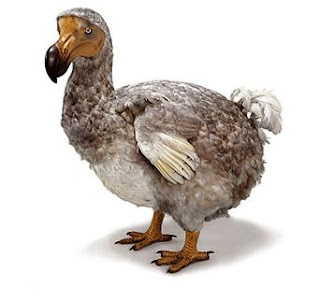And now: I give you the bird...with a word problem or two. (Actually, I always struggled with word-math problems, but I know there's an easier way. Sure there is: do 'em with an interesting topic!
Answer sheet? Are you kidding? YOU'RE doing it.)
Bird Facts
Some cuckoos “borrow” nests and parents for their offspring. The female cuckoo finds nests of her own species that already have eggs in them. She gets rid of one egg from each next and lays one of her own in its place. Thus, other birds, such as sparrows and wrens, raise her chicks for her. To find out more about birds, solve the following math problems, but don’t let them drive you “cuckoo.”
1. The deepest diving bird is the emperor penguin.
It can dive 298 yards minus 24 feet below the surface. How many feet is that?
2. The longest living bird on record was an Andean condor, which lived 77 years minus 260 weeks.
How many years did it live?
3. Dodoes became extinct in the year 8620 minus 6939, largely because they were killed by explorers and the hogs and monkeys which explorers introduced to their island habitat.
In what year did they become extinct?
4. The fastest level flights are made by the spine-tailed swift, which has been recorded at a speed of 121 minus 14.75 miles per hour. How fast is that?
5. Male ostriches can reach a weight of 356 pounds minus 176 ounces. How many pounds does it weigh?
6. The largest egg laid by any known animal was that of the extinct elephant bird. One preserved specimen measures 60 minus 26.3 inches around the long axis. How many inches is that?
7. The incubation temperature for most species of birds is about 200 minus 96 degrees Fahrenheit. How many degrees is that?
8. The smallest bird, the bee hummingbird, weighs 1 pound minus 15.944 ounces. How many ounces does it weigh?
9. The heaviest turkey on record weighed 80 pounds minus 17 and ¼ ounces. How many ounces did it weigh?
10. The largest nest on record is 24 feet minus 174 inches wide. It is 20 feet deep. It was built by bald eagles. How many feet wide was it?
11. The puffin can hold about 428 minus 398 fish in its beak at once. No one knows where most of these mysterious birds spend the winter. About how many fish can it hold?
12. The roadrunner likes to race along the ground and can reach speeds of 27 miles per hour minus 5280 feet per hour. How fast can it travel?
13. The number of eggs laid at one time is called a clutch. It can vary from one egg to (37x5) minus (41x4) eggs, depending on the species. How many eggs is that?
14. The longest average incubation period belongs to the wandering albatross. Its eggs normally take about 90 days minus 264 hours to hatch. How many days is that?
15. The mallee fowl of Australia builds incubation mounds that have been measured up to 15 feet in height and up to 53 feet minus 6 yards across.
How many feet across is that?


No comments:
Post a Comment